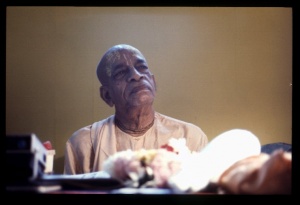CC Madhya 20.258 (1975): Difference between revisions
(Vanibot #0027: CCMirror - Mirror CC's 1996 edition to form a basis for 1975) |
(Vanibot #0020: VersionCompareLinker - added a link to the Version Compare feature) |
||
| Line 2: | Line 2: | ||
<div style="float:left">'''[[Sri Caitanya-caritamrta (1975)|Śrī Caitanya-caritāmṛta (1975)]] - [[CC Madhya (1975)|Madhya-līlā]] - [[CC Madhya 20 (1975)|Chapter 20: Lord Śrī Caitanya Mahāprabhu Instructs Sanātana Gosvāmī in the Science of the Absolute Truth]]'''</div> | <div style="float:left">'''[[Sri Caitanya-caritamrta (1975)|Śrī Caitanya-caritāmṛta (1975)]] - [[CC Madhya (1975)|Madhya-līlā]] - [[CC Madhya 20 (1975)|Chapter 20: Lord Śrī Caitanya Mahāprabhu Instructs Sanātana Gosvāmī in the Science of the Absolute Truth]]'''</div> | ||
<div style="float:right">[[File:Go-previous.png|link=CC Madhya 20.257 (1975)|Madhya-līlā 20.257]] '''[[CC Madhya 20.257 (1975)|Madhya-līlā 20.257]] - [[CC Madhya 20.259 (1975)|Madhya-līlā 20.259]]''' [[File:Go-next.png|link=CC Madhya 20.259 (1975)|Madhya-līlā 20.259]]</div> | <div style="float:right">[[File:Go-previous.png|link=CC Madhya 20.257 (1975)|Madhya-līlā 20.257]] '''[[CC Madhya 20.257 (1975)|Madhya-līlā 20.257]] - [[CC Madhya 20.259 (1975)|Madhya-līlā 20.259]]''' [[File:Go-next.png|link=CC Madhya 20.259 (1975)|Madhya-līlā 20.259]]</div> | ||
{{CompareVersions|CC|Madhya 20.258|CC 1975|CC 1996}} | |||
{{RandomImage}} | {{RandomImage}} | ||
==== TEXT 258 ==== | ==== TEXT 258 ==== | ||
| Line 11: | Line 10: | ||
<div class="verse"> | <div class="verse"> | ||
:sahasra-patraṁ kamalaṁ | :sahasra-patraṁ kamalaṁ | ||
:gokulākhyaṁ mahat padam | :gokulākhyaṁ mahat-padam | ||
:tat-karṇikāraṁ tad-dhāma | :tat-karṇikāraṁ tad-dhāma | ||
:tad anantāṁśa-sambhavam | :tad anantāṁśa-sambhavam | ||
| Line 20: | Line 19: | ||
<div class="synonyms"> | <div class="synonyms"> | ||
sahasra-patram—with thousands of petals; kamalam—resembling a lotus flower; gokula-ākhyam—named Gokula; mahat padam—the supreme abode; tat-karṇikāram—the whorl of that lotus flower; tat-dhāma—the abode of the Lord; tat—that; ananta-aṁśa—from the expansion of | sahasra-patram—with thousands of petals; kamalam—resembling a lotus flower; gokula-ākhyam—named Gokula; mahat-padam—the supreme abode; tat-karṇikāram—the whorl of that lotus flower; tat-dhāma—the abode of the Lord; tat—that; ananta-aṁśa—from the expansion of energy of Ananta; sambhavam—creation. | ||
</div> | </div> | ||
| Line 27: | Line 26: | ||
<div class="translation"> | <div class="translation"> | ||
" 'Gokula, the supreme abode and planet, appears like a lotus flower that has a thousand petals. The whorl of that lotus is the abode of the Supreme Lord, Kṛṣṇa. This lotus-shaped supreme abode is created by the will of Lord Ananta.' | |||
</div> | </div> | ||
| Line 34: | Line 33: | ||
<div class="purport"> | <div class="purport"> | ||
This verse is quoted from | This verse is quoted from Brahma-saṁhitā (5.2). | ||
</div> | </div> | ||
Latest revision as of 13:04, 27 January 2020
Śrī Caitanya-caritāmṛta (1975) - Madhya-līlā - Chapter 20: Lord Śrī Caitanya Mahāprabhu Instructs Sanātana Gosvāmī in the Science of the Absolute Truth

His Divine Grace
A.C. Bhaktivedanta Swami Prabhupada
A.C. Bhaktivedanta Swami Prabhupada
TEXT 258
- sahasra-patraṁ kamalaṁ
- gokulākhyaṁ mahat-padam
- tat-karṇikāraṁ tad-dhāma
- tad anantāṁśa-sambhavam
SYNONYMS
sahasra-patram—with thousands of petals; kamalam—resembling a lotus flower; gokula-ākhyam—named Gokula; mahat-padam—the supreme abode; tat-karṇikāram—the whorl of that lotus flower; tat-dhāma—the abode of the Lord; tat—that; ananta-aṁśa—from the expansion of energy of Ananta; sambhavam—creation.
TRANSLATION
" 'Gokula, the supreme abode and planet, appears like a lotus flower that has a thousand petals. The whorl of that lotus is the abode of the Supreme Lord, Kṛṣṇa. This lotus-shaped supreme abode is created by the will of Lord Ananta.'
PURPORT
This verse is quoted from Brahma-saṁhitā (5.2).